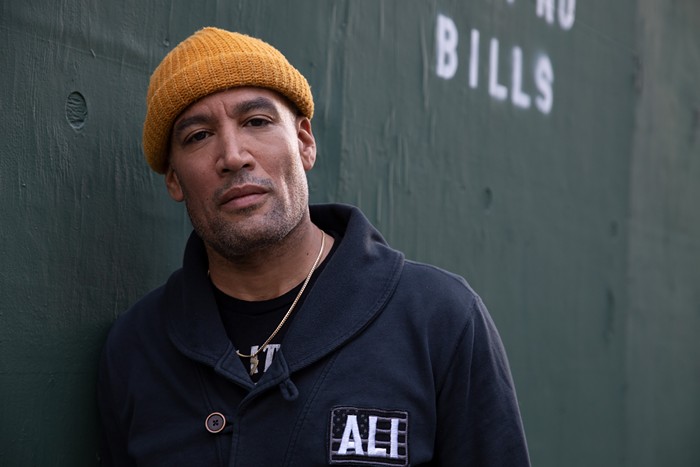WINDOWS BLANKETED THICK with wet condensation, the Get Up Kids were no longer visible to the throngs of kids pressed against the windows at Koo's Café. The Orange County all-ages co-op had long since exceeded a rib-crushing level of capacity by the time openers Braid took the stage (read: the living room floor) and those unable to contort themselves to get inside were stuck with faces and palms pressed against the outer windows, it all resembling a scene from some long-lost George Romero flick (if you swapped the swarms of undead for well-behaved emo kids). Yet by the time the Get Up Kids launched into "Coming Clean," from their Four Minute Mile debut, the collective heat had rendered the windows useless for those stuck on the outside. It was May 16, 1998, and for those in attendance, the Get Up Kids just might have been the greatest band rock and roll had to offer.
We were all young, slightly misguided—see the above "greatest band" statement for proof of that—and overly eager to plant the emo flag (sweater?) deep into the soil of the pop music landscape. We wished that when the dust settled, this moment would have been our CBGB, our less-stabby Altamont, our very own tiny slice of rock history that we witnessed wide eyed and firsthand. Of course, it didn't actually work out that way. Emo soon shamed itself by anointing the sparkling pompadour of Dashboard Confessional as its de facto voice, later divorcing itself entirely from relevance through the misogynistic screams of manscara frontmen and all its laughable subgenres. Nowadays emo itself is a Hot Topic punchline, a forgettable teenage identity—the Juggalos of the middle class—nearly unrecognizable from its once-sincere roots.
The Get Up Kids didn't escape the fallout as well as we had hoped. Four Minute Mile begat the breakthrough Something to Write Home About, which in turn earned the band a level of popularity they genuinely seemed uncomfortable with. The Get Up Kids wanted to be Uncle Tupelo, not Underoath, and their abrupt segue into mature (boring) rock via On a Wire left them listlessly stalled, a band uncomfortable in their own skin and ashamed of what they had wrought. Its follow-up, Guilt Show, was the album you make when you want to implode your band and alienate your fanbase. In that right, it was quite successful.
Now with thicker waistlines and kids of their own, the Lawrence, Kansas, band has resurfaced. Reunion dates paved a path to the recording studio, the result of which is the self-released There Are Rules. Their finest moments well in the past, the Get Up Kids do a commendable job of trying to capture their energy and tempo of yore, without the emotional purging. But ultimately it's a forgettable endeavor, one that lacks the vulnerable personalities that highlighted their earliest recordings. (Or, in simpler speak, the songs of There Are Rules are the ones you'll have to labor through while wishing the band would stop fucking around and start playing "Don't Hate Me.")
These past two weeks have seen a series of reunited and repacked emo vets pass through Portland, with members of Jawbreaker (Forgetters), Texas Is the Reason (Atlantic/Pacific), and the Get Up Kids rounding out the parade of nostalgia. Which is, of course, what this all comes down to (with the notable exception of Forgetters, who seem determined—right down to their very name—to erase the past). Not soon after the floor of Koo's emptied out on that early summer night, we all lost control of a genre we once held so dear. Now, over a decade later, we're trying to revise history and let the good guys win. I suppose there's nothing wrong with that.



















